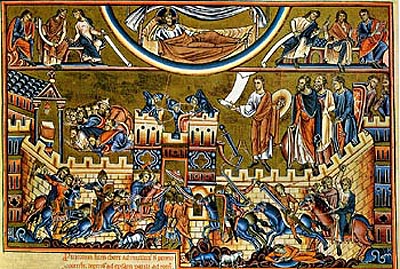Book-review on War, Just War by Atila Sinke Guimarães
(Los Angeles: TIA, 2003), 100 pp.
Based on the tone of his introduction and first few chapters, one gets the sense that Mr. Guimarães begrudgingly wrote this book. It seems that it was at first an issue which he, given the chance, would rather not examine. However, it seems that he deemed it necessary to extensively comment on the subject because most notable Catholic traditionalists were coming out vehemently against military involvement in Iraq.
Clearly, that position didn’t sit well with the author and he felt compelled to show that many of the anti-war comments were inconsistent with Catholic traditionalism. He expresses frustration that fellow traditionalists who were against the war were presenting their position as a “kind of dogma.” This book powerfully counters those anti-war sentiments.
When one reads Guimarães, one immediately gets a sense that he is not only a genius, but much more importantly to our purposes, a man who is gifted with a deep sensus Catholicus. That rare sense of faith and love for the teachings of the saints is evident in his latest work.
The course of the book follows a similar structure as the widely-celebrated In the Murky Waters of Vatican II. It should be considered an instant traditional Catholic classic, primarily for its methodology. If you’re looking for an American Constitutional Law argument, or a debate concerning the War Powers Act, you will be disappointed. This book is Catholic, period. Guimarães simply gathers his evidence, i.e., the writings of the saints regarding war, and applies these teachings to the war in Iraq.
Mr. Guimarães asserts his main thesis: that the war on terrorism is just and that “the United States and its allies have the right and the duty to wage war against it.” Though military involvement in Iraq serves as the philosophical focal point of this discussion, Guimarães expands the discussion to treat the war on terrorism, wherever it exists, rather than concentrating solely on Iraq.
He counsels those who are in favor of military action in Afghanistan, yet against military action in Iraq, that their position is difficult to adopt. His position is that the war with Iraq is simply a piece of the geopolitical puzzle in the war against terrorism. Writes Guimarães:
“We are witnessing an en masse effort of the United States government and military forces that has already touched two countries and most probably will extend to others. The whole effort needs to be judged as a unit, and not separately.”

Above, God watches over the war,
which He often approves and even commands to be made |
The book is actually much more than a mere defense of military action in Iraq. In fact, it serves as a primer to illustrate the Catholic notion of warfare. To that end, Guimarães cites Bellarmine, Suarez, Vitoria, St. Alphonsus, as well as recognized moral theologians regarding the topic of just war. Guimarães also devotes an entire chapter to a Scriptural examination of war, showing that God himself commanded war.
One of the highlights of this book is a scathing indictment of pacifism. Based on his research, Guimarães summarizes that the post-Vatican II papal observations concerning war have been not only out of line with tradition, but also dangerously naïve. He cites a clear example of this naïve pacifism with a quote from Pope John XXIII’s Pacem in Terris:
"Everyone must sincerely cooperate in the effort to banish fear and the anxious expectation of war from men’s minds. But this requires that the fundamental principles upon which peace is based in today’s world be replaced by an altogether different one, namely, the realization that true and lasting peace among nations cannot consist in the possession of an equal supply of armaments, but only in mutual trust."
As one could conclude from War, Just War, and Atila’s other writings, Pope John’s statement is not simply pacifistic absurdity reaching a crescendo, it is far more dangerous. As Guimarães points out, this quote is illustrative of a practical denial of the doctrine of original sin. Guimarães illustrates how this Pacem in Terris logic has been philosophically adopted by the present Roman Curia and even by Pope John Paul II himself.
As a matter of fact, Guimarães clearly illustrates that Pope John Paul II whimsically did not even bother to appeal to a single Catholic authority on the issue of war with Iraq. He appealed merely to the United Nations, and so strong was his appeal, that he was even willing to subordinate his own authority to his erroneously perceived authority of the United Nations!
At the risk of giving away the ending, Guimarães reckons that the present Vatican leadership favors a one-world government for the purpose of doing away with war entirely. Guimarães here unmasks the ugly face of pacifism, illustrating that pacifism leads to human misery. Once you presume, as Vatican leadership has presumed, that war is the greatest possible evil, then anything becomes preferable to it, including totalitarianism. Perhaps this is why Pope John Paul II is willing to move the chair of Peter to the back seat of leadership.
In short, Mr. Guimarães succinctly lays waste the most common anti-war arguments. It is, far and away, the most complete Catholic analysis of the American war on terrorism to date, and as such, should be required reading for every traditional Catholic.

Posted September 12, 2003
|